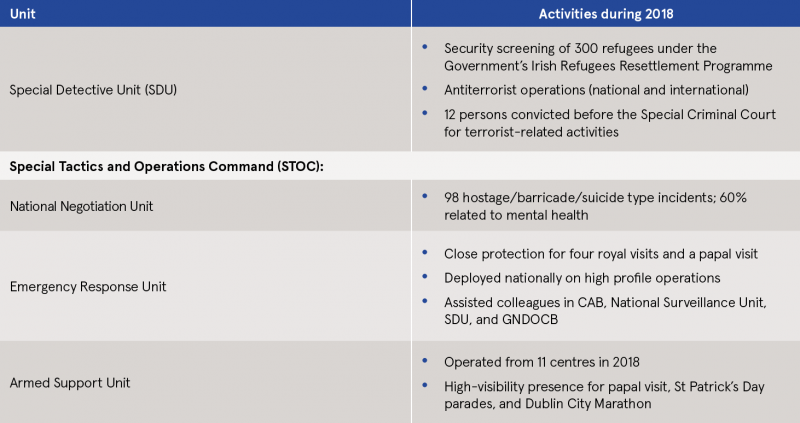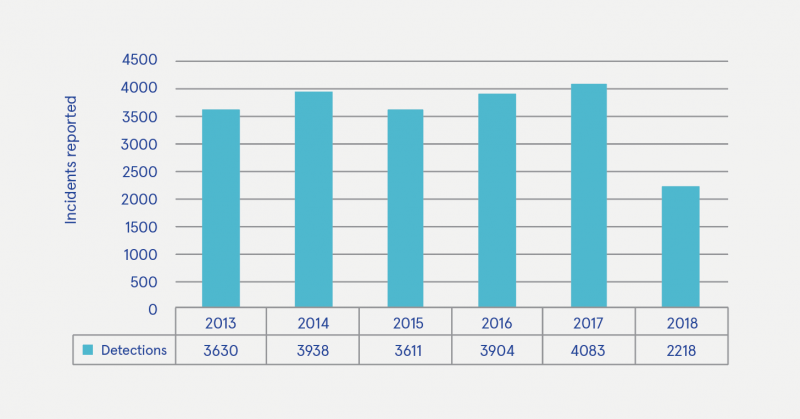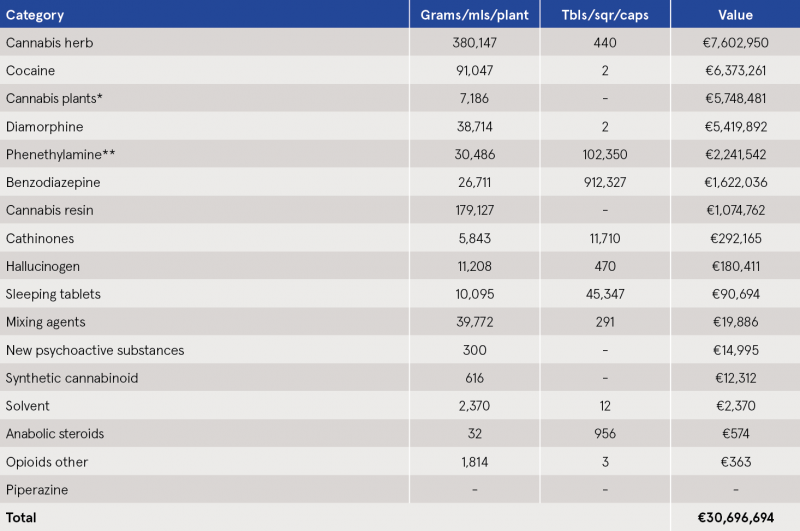Guiney, Ciara (2020) An Garda Síochána annual report, 2018. Drugnet Ireland, Issue 75, Autumn 2020, pp. 24-27.
| Preview | Title | Contact |
|---|---|---|
|
PDF (Drugnet 75)
590kB |
In December 2019, An Garda Síochána (AGS) published their annual report for 2018.1 While 2018 was considered a challenging year for AGS, it was also viewed positively. The report identifies where targets from the 2018 Policing Plan2,3 were fully and partially met and where they were not. This article will first report on activities related to national policing; followed by national security and intelligence; community safety; statistics for detections of incidents related to the sale and supply of drugs; and Garda drug seizures for 2018.
National policing
Gardaí work in various units to fight crime across Ireland. What follows is a brief outline of a selection of the work undertaken by some of these units.
National Criminal Intelligence Unit
The National Criminal Intelligence Unit (NCIU) works with national and local investigation units with the aim of finding, stopping, and dismantling organised crime groups. The main point of contact within NCIU is the National Criminal Intelligence Officer (NCIO). Its role is to provide other CIOs within AGS with information and intelligence on incidents as they arise.
Garda National Drugs and Organised Crime Bureau
Table 1 provides a breakdown of seizures relating to operations carried out by the Garda National Drugs and Organised Crime Bureau (GNDOCB) in 2018.
Operation Thor
Operation Thor, AGS’s national anti-burglary operation, commenced in November 2015. Between November 2015 and 31 December 2018, there were 9,200 arrests and 177,460 checkpoints. The incidence of burglary in residential (n=41,588) and non-residential (n=15,481) settings decreased by 35% and 23%, respectively.
Garda National Protective Services Bureau
The Garda National Protective Services Bureau (GNPSB) targets suspects involved in online child exploitation, child sexual abuse, and human trafficking. Operation Ketch, managed by the Online Child Exploitation Unit (OnCE), targeted suspects who possess, import, and supply child abuse material online. Overall, OnCE identified 137 targets in 137 searches under warrant. In 2018, some 56 children that were being exploited online were identified by the Victims Identification Unit. Human trafficking increased by 25% between 2017 (n=51) and 2018 (n=64).
GNPSB also works with agencies in the United Kingdom (UK) (e.g. National Crime Agency and North Wales Police) to identify bodies of individuals found on the west coast of the UK who may have been reported missing in Ireland. From its inception in January 2017 to 2018, comparative analysis utilising familial DNA resulted in 10 individuals being identified.
Garda National Cyber Crime Bureau
The Garda National Cyber Crime Bureau (GNCCB) assisted in several enquiries: child pornography (248 cases); theft and fraud (83 cases); child exploitation/grooming (31 cases); data retrieval (30 cases); and sexual assault/rape (19 cases). It provided technical support on several operations. For example, in Operation Myriad, which targeted organised crime groups involved in fraud, money laundering, and forgery, 50 exhibits were examined. Similarly, serious crime investigations were supported in forensic examination of exhibits related to murder, organised criminal gangs, missing persons, and terrorism.
Criminal Assets Bureau
In 2018, the Criminal Assets Bureau (CAB) targeted ‘lower level’ associates of major organised crime gangs with the aim of ‘disrupting’ their advancement within these organisations. The main crime categories focused on included:
- Robberies
- Stolen vehicles
- Sale and supply of controlled drugs
- Sale of encrypted devices
- International mail fraud scams
- Fuel and tobacco smuggling.
Table 1: Summary of seizures by GNDOCB

Source: AGS annual report, 2018, p. 7
* 59 relates to threat-to-life operations carried out since the murder of David Byrne at the Regency Hotel, Dublin on 5 February 2016. Included in the threat-to-life operations figure are Special Crime Task Force arrests as well as drug seizures and arrests from controlled delivery operations carried out in conjunction with Customs and Revenue Service.

Source: AGS annual report, 2018, pp. 15–17
Operational support services
AGS has several operational support units to support its work: the Garda Air Support Unit (GASU), Garda Dog Unit, Garda Mounted Unit, and Garda Water Unit.
- GASU: In March 2018, GASU provided support to local fire services at a hotel fire in Ballymun, Dublin by providing live aerial pictures to personnel, enabling the identification of hotspots, secondary fires, and people who may be trapped.
- Garda Dog Unit: The unit carried out 1,648 searches in 2018 to find missing persons, drugs, firearms, explosive substances, and stolen property.
- Garda Mounted Unit: The aim of this unit is mainly crime prevention. It has provided high-visibility patrols as part of Operation Thor and covers public events, crowd control, and VIP protection.
- Garda Water Unit: In 2018, this unit recovered 10 bodies as part of humanitarian missing person searches.
National security and intelligence
Security and intelligence
The national security and intelligence section provides intelligence to units working to detect and examine threats to Ireland from terrorists and organised crime gangs. The threat level in 2018 was ‘moderate’, indicating that ‘an attack is possible but unlikely’ (p. 14). Table 2 provides an overview of some of the work carried out by this section.
Liaison and protection
Within AGS, the Garda Síochána Analysis Service evaluated national initiatives, such as Sex Offender Risk Assessment and Management (SORAM), and contributed to national strategies. In addition, AGS continued to work closely with agencies outside Ireland. Its activities included:
- Multiagency terrorism exercise: AGS tested response capabilities in the event of terrorist attacks in Operation Barracuda.
- Fixed Interpol Network Database (FIND): AGS can query information on stolen/lost travel paperwork 24/7. Between November 2016 and February 2019, some 23,976,128 checks were carried out on passengers arriving in Ireland by air and sea.
- Interpol European Regional Conference: This conference was hosted by AGS in Dublin; 229 delegates and observers attended.
- Europol: AGS supported several European Joint Action Days, such as cyberattacks, human trafficking, and cocaine trafficking. In addition, they contributed to Europol’s Organised Crime Threat Assessment, the Internet Organised Crime Threat Assessment, and reports on terrorism in the European Union.
- International Coordination Unit (ICU): AGS continued to manage the National Internal Security Fund Project, focusing on projects that prioritised policing and security.
Community safety
Community engagement is at the heart of the work of AGS. Several activities were carried out in 2018, such as crime prevention campaigns (e.g. burglary prevention, public assaults, online safety), Crimecall, Campus Watch, and the Joint Agency Response to Crime Conference.
Statistics
Incidents of sale and supply of drugs marked as detected
Figure 1 shows the number of sale and supply incidents detected between 2013 and 2018. Between 2013 and 2015, there was on average 311 incidents per month. Between 2016 and 2018, there was on average 285 incidents per month. The report states that the detection figures should be interpreted with caution as the PULSE system used to record detections was upgraded in February 2018. Hence, detections before and after the upgrade cannot be compared.
Garda-only drug seizures, 2018
Drug seizures are submitted to Forensic Science Ireland (FSI) for analysis. Overall, it was estimated that the value of drugs seized by Gardaí in 2018 was €30,696,694. As illustrated in Table 3, the most prominent drugs seized in Ireland with values greater than €1 million were cannabis herb, cocaine, cannabis plants, diamorphine, phenethylamines, benzodiazepines, and cannabis resin. While cannabis plants are ranked third, it is likely that this figure is higher, as not all plants are sent to FSI for analysis.
Conclusion
Garda Commissioner Drew Harris acknowledged the ‘dedication and determination of Garda members, staff and reserves to keeping people safe’ (p. 2). Evidence of this work is seen throughout the report, from significant drug seizures, reductions in burglaries, education initiatives on shielding themselves from crime to positive engagements with communities across Ireland (p. 3).
Commissioner Harris stated that the main goal of AGS is the keep people safe. This can be achieved by delivering an ‘efficient, effective and ethical police and security service’ (p. 3). He acknowledged that significant advances were made to achieve this goal in 2018 and is confident that the provision of services to the public and the State by AGS will progress further in 2019 (p. 3).
Figure 1: Detected incidents of sale and supply of drugs

Source: Operational PULSE data ICCS types: 1011, 1012, 1021, AGS annual report, 2018, p. 45
Table 3: Garda drug seizures, 2018

Source: AGS annual report, 2018, p. 49
* Cannabis plants are calculated based on figures recorded on PULSE as not all plants seized are routinely sent to FSI.
** Phenethylamines include ecstasy (MDMA) and other similar related drugs.
1 An Garda Síochána (2019) An Garda Síochána: annual report 2018. Dublin: An Garda Síochána. https://www.drugsandalcohol.ie/32192/
2 An Garda Síochána Strategic Planning Unit (2018) An Garda Síochána annual policing plan, 2018. Dublin: An Garda Síochána. https://www.drugsandalcohol.ie/29169/
3 Guiney CH (2018) An Garda Síochána policing plan 2018. Drugnet Ireland, 67 (Autumn): 20–21. https://www.drugsandalcohol.ie/29934/
MM-MO Crime and law > Substance related offence > Drug offence > Illegal distribution of drugs (drug market / dealing)
MM-MO Crime and law > Substance related offence > Drug offence > Illegal drug possession (seizures)
MM-MO Crime and law > Justice system > Justice / enforcement agency > Police (Garda)
VA Geographic area > Europe > Ireland
Repository Staff Only: item control page